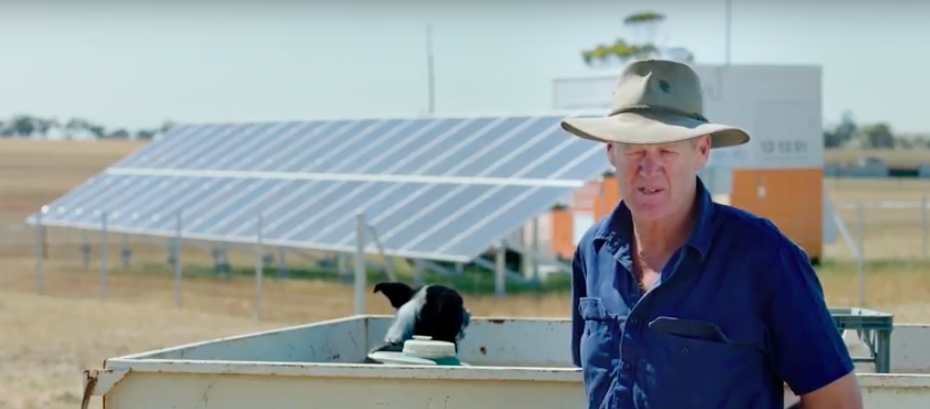Plagued by high energy costs and unreliable power supply in far-flung rural areas, Aussie farms are eager to move into renewables, but are often put off by the lack of support. Highlighting the energy issues the sector is facing, an Australian agricultural lobby is calling on the next federal government to “fix the energy disaster killing agricultural competitiveness”.
With the ever-increasing electricity prices, Australian farmers are struggling to produce food, fibre and renewable fuel for Australians, says Ag Energy Taskforce, a group of agricultural bodies convened by the National Irrigators’ Council and involving thirteen regional irrigators, farming and commodity groups.
While the sector has the biggest take up of Clean Energy Finance Corporation (CEFC) grants, funding hundreds of on and off-grid solar installations – with many more funded solely by the farmer, much more needs to be done to ensure the sector’s competitiveness at all levels, the group underlines.
Walking the talk
As noted in the report titled Off the grid or off the plate: Fixing the energy disaster killing agricultural competitiveness, over $100 million of CEFC grants have been used over the last three years to realize 417 on-grid and 20 off-grid solar power project. These project were also on average larger than in other sectors, with loans seven times the average at over $250,000.
On top of that, farmers took additional loans with the CEFC to the tune of $100 million during this time, to improve the energy efficiency of farm buildings and production systems. Meanwhile, there was a number of projects where farmers have purchased renewable or energy efficiency technologies outright or sought funding elsewhere.
“Australian farmers are walking the talk when it comes to renewables, they are leading the transition.But the policy failures are still hurting,” the report says. “For many producers solar without storage is not a viable option and for many of them going off grid means new diesel generators. And for those left on the grid? Their costs just keep going up.”
Key demands
The group lists key requests ahead of the May 18 election:
- A 16 cent/kWh power price ceiling;
- Implementing the full recommendations of the ACCC Inquiry into retail electricity prices, including those relating to network costs;
- A NEM rule change optimising the Regulated Asset Base;
- Introduction of irrigator tariffs – recognising that irrigation demand is not driving critical peak loads on hot days;
- Genuine competition – a properly functioning market with competition at all levels;
- Removal of network barriers to sharing of local energy generation on local networks;
- Reducing the barriers to connecting on-farm generation to the grid;
- A stable energy policy that is technology-neutral, market-based and economy-wide, delivering affordable, reliable and secure energy;
- A $250 million water and energy productivity program focusing on support for energy solutions in irrigated agriculture including smart water efficient practices, renewables, storage and hybrid systems. Eligible technologies will include solar generation and battery storage (where applicable), the suite of digital and engineering technologies required to optimise energy efficiency and demand management on farm and smart grid connection solutions; and
- Funding support for policy engagement helping put agriculture on an even footing with well-resourced energy companies for engagement in policy and regulatory processes
Ag Energy Taskforce says that these measures are necessary to put the agricultural sector back on track and strengthen its competitiveness, noting that the Australian farmers are losing its ability to compete globally, and seeing significant job losses and loss of income.
“Australian producers are being forced off the grid or out of business,” the report says. “Export competitiveness is disappearing and, as price takers, Australian farmers are seeing their viability dashed.”
On-farm renewables as cost-effective solution
As demonstrated by a report from Commonwealth Bank last year, 76% of Australian farmers would like to invest in solar with battery storage, followed by 34% interested in solar without a battery. More than nine in ten farmers surveyed said they had some level of interest in energy efficiency investment.
Last month, the Coalition government unveiled a $50 million pot to support up to 50 off-grid and fringe-of-grid feasibility studies investigating whether building a microgrid can be a cost-effective solution. The government’s move followed initiatives from big utilities to deploy stand-alone systems as a cost-effective alternative to maintaining and replacing ageing and skinny grid infrastructure.
WA’s government-owned utility Horizon Power announced plans to roll out 13 solar and battery technology units at 14 farms in the Esperance region and thus replace 54 kilometers of ageing wires and poles. Only a couple of weeks earlier, WA’s regional utility Western Power announced it was all set to roll out 57 stand-alone power systems at farms, having inked $8.8 million in contracts for the first stage of its landmark off-grid program for regional properties.
This content is protected by copyright and may not be reused. If you want to cooperate with us and would like to reuse some of our content, please contact: editors@pv-magazine.com.









By submitting this form you agree to pv magazine using your data for the purposes of publishing your comment.
Your personal data will only be disclosed or otherwise transmitted to third parties for the purposes of spam filtering or if this is necessary for technical maintenance of the website. Any other transfer to third parties will not take place unless this is justified on the basis of applicable data protection regulations or if pv magazine is legally obliged to do so.
You may revoke this consent at any time with effect for the future, in which case your personal data will be deleted immediately. Otherwise, your data will be deleted if pv magazine has processed your request or the purpose of data storage is fulfilled.
Further information on data privacy can be found in our Data Protection Policy.